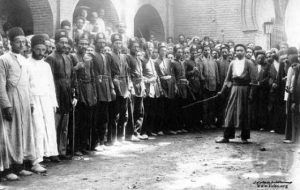By Reza Parchizadeh
[Reza Parchizadeh is a commentator on Iranian affairs. The opinions expressed are his own.]
During the 2015 nuclear negotiations with the P5+1, the Tasnim news agency, which has strong links to the Islamic Revolutionary Guards Corps (IRGC), reported that “elements within the seditious faction,” namely the supporters of the late Ali Akbar Hashemi Rafsanjani, had suggested that former British Foreign Secretary Jack Straw should mediate the deal on behalf of Iran.
A member of the so-called “seditious faction” has now called on the state to take advantage of Mr. Straw’s forthcoming trip to Iran and reboot the nuclear negotiations. He has said: “The nuclear negotiations will not move forward in their current state. We should try to employ and contract Mr. Straw to mediate the talks on behalf of Iran.”
The accuracy of the report notwithstanding, there is some hidden truth in all of this: namely that the British establishment has always had a deep affinity for Islam and the Islamists. Therefore, it is only natural for the “seditious faction” and the regime itself to turn to Britain for help in lifting the sanctions and renegotiating the nuclear deal.

In the 19th century, the British Empire used Islamists to broaden its sphere of influence and achieve its colonial objectives in the Middle East.
I realize that this short article cannot do justice to this complex issue, but I will aim to provide a brief account of how Great Britain has used Islamism as a colonial tool in Iran.
The U.S. has always tried to achieve its political objective by asserting its economic power. By contrast, Britain has historically used a subtle psychological approach towards foreign policy. It has always tried to gain maximum benefit by making a minimum financial investment. Hence, it has used Islamism as a tool to further its goals in the Middle East for the past two centuries.
Islam has been the predominant religion in the Middle East for more than a millennium. It is inherently political. The British have, therefore, tried to cultivate close ties with the Islamists as a way to influence and control Middle Eastern nations. That’s why they have traditionally supported the most populist and reactionary elements of the Iranian society for the past 100 years — namely the Islamic clergy. In other words, Britain has always supported ultraconservatives in Iran.
It would be helpful to see the region from the vantage point of senior English politicians if we are to gain a deeper understanding of British Foreign policy in the Middle East. Lord George Nathaniel Curzon (1859-1925) was a British conservative statesman, viceroy of India (1899-1905), Secretary of State for Foreign Affairs (1919-24) and a scholar of Eastern studies.
In his book “Orientalism” (1978), Professor Edward Said (1935-2003) writes about a speech delivered to the House of Lords by Curzon on September 27, 1909 in which he said: “The only way that we can retain our presence, power and influence in the East is by developing greater appreciation for its people, religion, culture, customs, history, psychology, and capabilities. In other words, we need to understand the genius of the East. Any steps that would strengthen our presence must be discussed with his Majesty’s government in the House of Lords.”
In his address, Curzon was making a case for “cultural colonialism” as an additional tool for strengthening British military and political control in the region. He criticized British government’s reluctance to invest political capital in Iran, which he thought held strategic importance as a buffer zone between the expansionist Soviet empire and the jewel in the British Crown, India. Curzon had traveled extensively through Iran, India and the Middle East. His book “Persia and the Persian Question,” written in 1892, was considered a definitive geopolitical and anthropological work on Iran.
The evidence has shown that British politicians have taken Curzon’s advice to heart, particularly after the power and the global influence of the British Empire started to decline at the end of the WWII. They supported Sayyid Jamal al-Din Asadabadi (Al-Afghani, 1839-1897) and his pan-Islamic Unity movement. Al-Afghani inspired later Islamist movements in the Middle East including the Muslim Brotherhood (Sunni organization founded in Egypt by Islamic scholar Hassan al-Banna in 1928) and Khomeinism (the founding ideology of the Islamic Republic of Iran.)

During the Iranian Constitutional Revolution (1905-11), some of the revolutionaries were allowed to take refuge at the British Embassy. But that was only a calculated move by the British to counter Russia’s support for the Persian monarch, Mohammad Ali Shah Qajar (1872-1925.) They continued to court the Islamists by supporting the royal court’s senior cleric, Sheikh Fazlollah Nouri (founder of political Islam in Iran,1843-1909) who opposed the constitutional movement. Their efforts crippled the Iranian Parliament and led to the eventual defeat of the Constitutional Revolution.
In 1953, Britain conspired with one of the most reactionary Islamists in modern times, Ayatollah Abol-Ghasem Kashani (1882-1962), to topple the government of Prime Minister Mohammad Mossadegh (1882-1967). The British government also supported the 1979 Islamic Revolution. At the time, the BBC broadcast most if not all public addresses by Ayatollah Ruhollah Khomeini. In the past four decades, the Islamists have managed to maintain their ties with Britain and the EU.
One of the reasons secularism and democracy have not taken root in Iran is the British government’s continued support for the Islamists in Iran. It is currently protecting elements of the regime who have invested money looted from the Iranian treasury in Britain – the money that belongs to Iranians from all walks of life, ethnic backgrounds and religious faiths. The old Iranian adage — “The British are behind it all!” — springs to mind.

